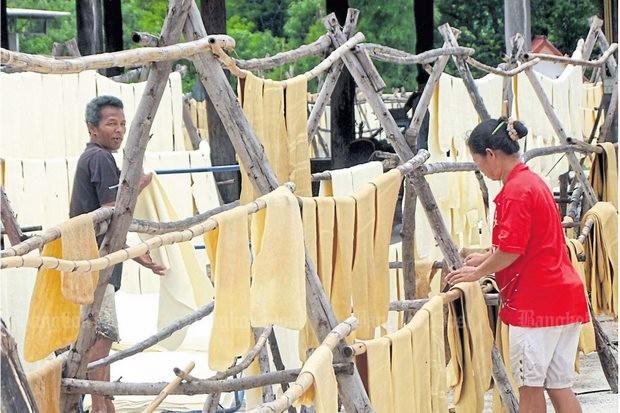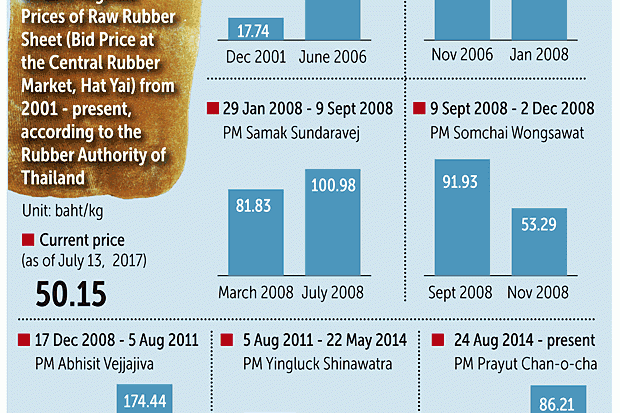Farmers hang rubber sheets out to dry in Buri Ram. Farmers again face a worldwide slump in rubber prices and want urgent measures put in place to help survive the crunch. (Photo by Surachai Piragsa)

More than 400 rubber planters converged on Songkhla City Hall Thursday demanding the government urgently step in to reverse tumbling rubber prices after they shed more than 40% in the space of a year, and as tensions with regional rivals starts to boil over.

A smaller number rallied for the same cause in neighbouring Nakhon Si Thammarat.
They also urged the administration to hold talks with Malaysia and Indonesia to find ways of pushing the price of rubber latex up to 70 baht per kg, considered the break-even point for rubber production. They have plummeted to about 40 baht per kg over the last year.
This comes after representatives from the three nations met at the International Tripartite Rubber Council (ITRC) in Malaysia on July 6-7 to air grievances and discuss pressing concerns.
Prime Minister Prayut Chan-o-cha earlier assigned the Rubber Authority of Thailand (RAOT) to seek cooperation from the two major rubber-producing nations in helping push prices back up, said Chaiwut Phongphaew, a former Democrat MP for Songkhla.
However, the agency returned with the news that the two countries blame Thai rubber farmers for the fall, Mr Chaiwut, who also leads the federation of Songkhla farmers, told the Bangkok Post.
“The RAOT’s message has disturbed rubber farmers, who ask why they are being blamed,” he said. “The agriculture and cooperatives minister must come forward to explain this.”
“We are not trying to turn rubber into a political tool. The falling prices have nothing to do with politics, but the government does have the power to influence them,” he added.
He said he found it hard to believe Malaysia would make such accusations.
Mr Chaiwut, who also owns a rubber plantation, said state authorities estimate the average cost of rubber production to be 50 baht a kg whereas 70 baht is more accurate.
This is because they fail to account for rising production costs, including labour, fertilisers and pesticides, he said.
Meanwhile, the federation of Songkhla farmers has called on the Department of Special Investigation (DSI) to examine the rubber trade in futures markets to determine whether attempts have been made to distort rubber prices.
Federation secretary-general Preecha Kasemsuk said many Thai nationals were involved in rubber trading in overseas futures markets.
It also demanded the DSI or National Anti-Corruption Commission check the government’s rubber stocks to determine whether any of the stored materials have been smuggled out to be sold, which could influence prices.
The federation called to establish an organisation monitoring rubber prices featuring experts from the Thailand Development Research Institute, university lecturers and representatives from rubber farmers.
According to Mr Chaiwut, Thai rubber farmers have also asked the government to come up with measures to make more use of rubber, especially domestically produced latex, in state projects.
At present the state relies on imports from Malaysia, he said.
Manufacturers tend to rely more on Malaysian latex even though Thai latex is reputed to be the best in the world, he said.
“This information about imports has never been disclosed. We only know because we found out about it ourselves,” he said, asking the government to explain itself.
He said more cooperation should also be sought from transnational manufacturers to use Thai rubber, which would help restore flagging prices.
Referring to state projects, he said the mixture of asphalt used to pave roads should include 50% latex but many agencies ignore this to save costs, making roads less durable.


























